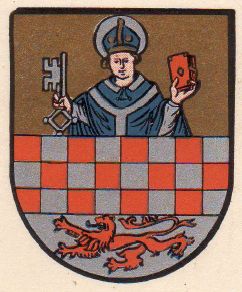Rönsahl: Difference between revisions
Jump to navigation
Jump to search
Knorrepoes (talk | contribs) No edit summary |
Knorrepoes (talk | contribs) m (Text replace - "[[Literature" to "{{media}} [[Literature") |
||
| Line 18: | Line 18: | ||
The arms show the bar taken from the arms of the Counts of the Mark, who ruled the area in the medieval times. The upper half shows the bust of St. Servatius, the local patron saint. The local St. Servatius well was a famous place of pilgrimage. The base shows the lion of the Counts of Berg, who also ruled part of the area for a long time. | The arms show the bar taken from the arms of the Counts of the Mark, who ruled the area in the medieval times. The upper half shows the bust of St. Servatius, the local patron saint. The local St. Servatius well was a famous place of pilgrimage. The base shows the lion of the Counts of Berg, who also ruled part of the area for a long time. | ||
{{media}} | |||
[[Literature]] : Meijer, 1940 | [[Literature]] : Meijer, 1940 | ||
Revision as of 04:52, 9 July 2014
| Heraldry of the World Civic heraldry of Germany - Deutsche Wappen (Gemeindewappen/Kreiswappen) |
RÖNSAHL
State : Nordrhein-Westfalen
District (Kreis) : Märkischer Kreis (1969-1975 Lüdenscheid, until 1969 Altena)
Incorporated into: 1969 Kierspe
Origin/meaning
The arms were granted on October 17, 1935.
The arms show the bar taken from the arms of the Counts of the Mark, who ruled the area in the medieval times. The upper half shows the bust of St. Servatius, the local patron saint. The local St. Servatius well was a famous place of pilgrimage. The base shows the lion of the Counts of Berg, who also ruled part of the area for a long time.
Contact and Support
Partners:
Your logo here ?
Contact us
© since 1995, Heraldry of the World, Ralf Hartemink 
Index of the site
Literature : Meijer, 1940











